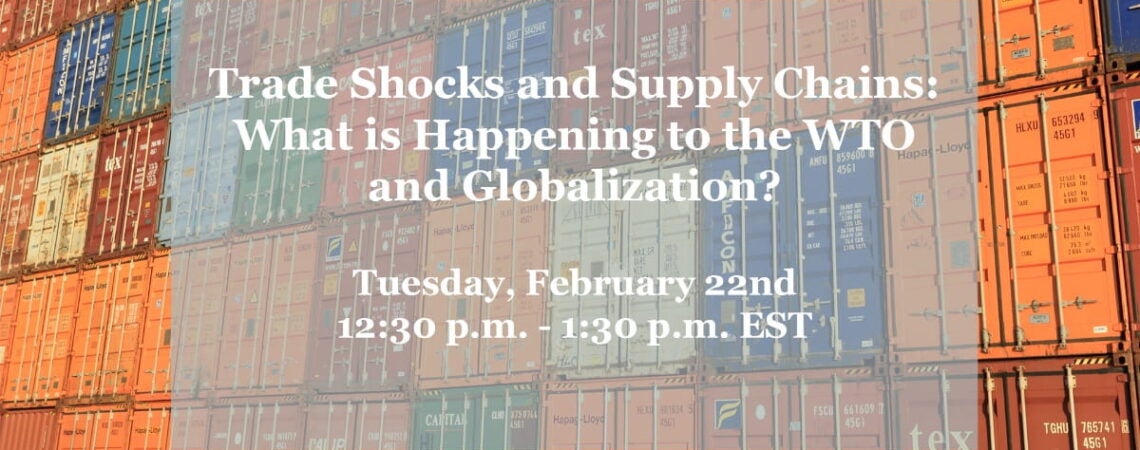On Tuesday, February 22, WITA and GWU discussed how the WTO has handled trade shocks and supply chains. The discussion also included how the WTO and globalization have responded to international trade being subjected to increased geo-political uncertainty and a major global health shock.
Featured Remarks:
Jay Shambaugh, Professor of Economics and International Affairs, Director of the Institute for International Economic Policy at the Elliott School of International Affairs, George Washington University.
Discussion Featuring:
Bob Koopman, Chief Economist of the World Trade Organization, Adjunct Professor of International Economics at the Graduate Institute, Geneva.
Moderator: Michael Moore, Director of the Masters of Arts in International Economic Policy program, former Director of the Institute for International Economic Policy, former Director of the International Trade and Investment Policy Program
SPEAKER BIOGRAPHIES:
Jay Shambaugh is a Professor of Economics and International Affairs and the Director of the Institute for International Economic Policy at the Elliott School of International Affairs at George Washington University.
Professor Shambaugh’s area of research is macroeconomics and international economics. His work includes analysis of the interaction of exchange rate regimes with monetary policy, capital flows, and trade flows as well as studies of international reserves holdings, country balance sheet exchange rate exposure, the cross-country impact of fiscal policy, the crisis in the euro area, and regional growth disparities.
He has had two stints in public service. He served as a Member of the White House Council of Economic Advisors from 2015-2017. Earlier, he served on the staff of the CEA as a Senior Economist for International Economics and then as the Chief Economist. He also spent 3 years as the Director of the Hamilton Project at the Brookings Institution. He is also a Faculty Research Fellow at the NBER and Non-Resident Senior Fellow in Economic Studies at Brookings.
Prior to joining the faculty at George Washington, Shambaugh taught at Georgetown and Dartmouth and was a visiting scholar at the IMF. Shambaugh received his Ph.D. in economics from the University of California at Berkeley, an M.A. from the Fletcher School at Tufts, and a B.A. from Yale University.
Robert B. Koopman serves as the Chief Economist and Director of the Economic Research and Statistics Division at the World Trade Organization. In this post Bob provides the Secretariat and Member Countries with analysis and information that promotes a deeper understanding of trade and trade policy’s role in economic growth and development.
Prior to this post he served as the Director of Operations and Chief Operating Officer for the United States International Trade Commission. Bob oversaw the Commission’s trade policy research and negotiation assistance to the President, the U.S. Trade Representative, and Congress; antidumping, countervailing duty, and safeguard; investigations; intellectual property investigations; maintenance and analysis of the Harmonized Tariff System, as well as the agency’s strategic planning and performance measurement initiatives. He also previously served as the Chief Economist and Director of the USITC Office of Economics, and numerous leadership and research positions at the Economic Research Service of USDA.
Bob previously taught international trade, applied international trade, advanced international trade, and trade and economic development in the Economics Department at Georgetown University, in Washington DC. Bob‘s research interests include measuring the economic effects of trade and trade policy changes, measuring global value chains, and the application and validation of large scale economic simulation models. Bob also currently serves as an ex officio member of the World Trade Review Editorial Board, and serves as an editor for the Springer Series Advances in Applied General Equilibrium Modeling, with James Giesecke and Peter Dixon.
Professor Michael Moore is Director of the Masters of Arts in International Economic Policy program and has been a faculty member at the Elliott School since receiving his doctorate in 1988. He received his B.A. in liberal arts from the University of Texas at Austin and his M.S. and Ph.D. in economics from the University of Wisconsin-Madison. Professor Moore teaches undergraduate and graduate courses in international trade theory and policy as well as international macroeconomics. He also has taught international economics to US diplomats at the Foreign Service Institute and students at the Fondation Nationale des Sciences Politiques (Sciences-Po) in Paris. He has published in numerous academic journals including the Journal of International Economics, International Trade Journal, Canadian Journal of Economics, Review of International Economics, European Journal of Political Economy, and Weltwirtschaftliches Archiv, and has been a contributor to five books. His commentary has appeared in numerous media outlets, including The Washington Post, The Financial Times, CNN, CBC, NPR, and NBC.
Professor Moore has served as Director of the Institute for International Economic Policy, Director of the International Trade and Investment Policy Program, and Associate Dean at the Elliott School.
Professor Moore served as Senior Economist for international trade on the President’s Council of Economic Advisors from 2002 to 2003.

